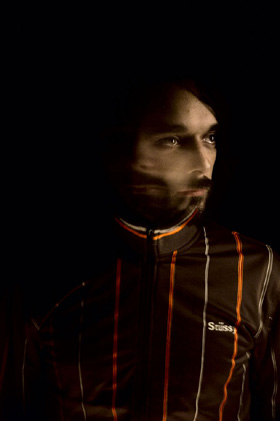 Hunz is a Brisbane-based indie artist who intersects innocent pop melodies with dark electronica. He’s Johannes van Vliet when recording, but his killer sound is augmented by a bassist and drummer on stage. I first saw Hunz perform in support of Yeo & The Freshgoods at Brisbane’s Press Club in November 2008; his music is brilliant, which is why I bought his debut album, When Victims Fight, immediately afterwards.
Hunz is a Brisbane-based indie artist who intersects innocent pop melodies with dark electronica. He’s Johannes van Vliet when recording, but his killer sound is augmented by a bassist and drummer on stage. I first saw Hunz perform in support of Yeo & The Freshgoods at Brisbane’s Press Club in November 2008; his music is brilliant, which is why I bought his debut album, When Victims Fight, immediately afterwards.
Hi Hunz! It’s 2009. There’s ten trillion bands on the internets who want our attention. Why should you have ours?
My music is a throw back to my teens, when video games were my escape to the problems that surrounded me.
I use glitches, beeps, pops and the original programs that were popular for writing music back then. I try to cram the songs full of my heart so that when I sing, it all comes out connected and very personal.
I have visions as I write this music, and it is my hope that soon people will see what I see as I embark on animating my music as well.
Your debut – 2008’s When Victims Fight – was marvelous, but I understand you’ve since written a new album.
My new album is called Thoughts That Move, and it was inspired by the RPM Challenge. My wife read about RPM on a website and said, “You should do this”. The concept behind the site is to record an album – ten tracks, or 35 minutes – in a month.
As I logged onto the website I started having doubts. It looked a bit dodgy – I should say I’m a graphics snob, and I feel I have the right to comment on web design and layout; I don’t – but as I looked around, it was evident that my initial doubts were wrong.
The RPM competition is about community and creating an outline that will help people – from bedroom guitarists to performing musicians – record an album within a month, albeit within February, the shortest month! In a matter of moments, I ran out into the lounge room and announced that I would accept this challenge.
A summary of what followed in the month of February was as follows:
- “Optimistic” Hunz would wake me up.
- “Creative Ideas” Hunz would hug me during my day-job and whisper sweet nothings in my ear
- “Realistic” Hunz would put me to sleep (well, keep me awake).
Halfway through the month, “Realistic” Hunz would wake me up. “Creative Ideas” Hunz had stomach cramps and had to go bye-bye, and “Optimistic” Hunz was being bashed.
In the last week, I just let everything go, and it all fell into place. Out popped this album Thoughts That Move, and wow, RPM was done for this year. There’s a more detailed account of the challenge at hunz.com.au.
As an electronic artist, the ability to quickly tweak and modify your songs lends itself to this sort of time-constrained project. How much live instrumentation did you use?
For this album, I asked a friend of mine in Nashville, Jesse Palmer (from a band called Skate Party, who did some tunes for HomeStarRunner) to work on a guitar part for You Said Hello. That was it. Everything else is mostly hand-drawn, which involves drawing in your waveform; another name for this is an oscillator. I would then do some basic ADSR (Attack – Delay – Sustain – Release) on it and use multiple channels to do the Add, Subtract, Multiply setups. It’s like creating your own SoftSynth VSTI plugin, but doing it right in the program instead.
I used the Renoise audio composition software for this project. The other instrumentation was from a lot of old, old loops I have found over time. I love flavour in drums, so I love to cut up live loops and shove them into new beats. I love it when hi-hats ring into snares or kick drums. It adds imperfections, and electronic music needs this to make sure it isn’t so rigid. I used string and Rhodes samples for a few tracks too.
I will eventually merge the live aspect of the music into the recordings, which will be heard on the next album. The guys in my band are amazing, and I would be silly to not have them influence the outcome of my tracks. There are parts they have both come up with that I miss dearly when I listen to When Victims Fight, and I’m not going to let that happen again. The only track on When Victims Fight that mixes electronic elements and the live band was Who Knows, and I feel like it’s a good start.
 When do you expect the RPM album to be in stores?
When do you expect the RPM album to be in stores?
This album will be free.
We are currently working out how to present this though, as people have requested physical copies and others are interested in paying something. We are also looking at ways of getting it into some digital distribution outlets so that people get it how they want.
I’m also releasing the original song files in a tracker format for Renoise (.xrns), which means they are 100% destructible, a bit like a GarageBand session.
I really want to pay my respects to the scene that inspired most of how I write music today. Back in the early days when I wrote music, it just got shared around the internet for everyone to pull apart. I guess with this album, I’m going back to that mentality a bit.
So the free album release is more a recognition of your past musical experience than a comment on the nature of musical distribution in 2009?
For me it was just how I used to release music in the past. You just released it online and hope for the best.
I was so excited when I saw that Nine Inch Nails and Radiohead successfully released music this way, for free. It is a step in a different direction that feels like it might just work.
‘Free’ for bands like NIN means that they can live off their live shows.
‘Free’ for bands like me may mean that more people will be attracted to the idea of my music, and then fall in love with it, which will thus provide more demand for me to tour around a bit.
It certainly is a game of “wait and see”, because I have no idea. But it just feels right, and ultimately, I won’t be disappointed. I’m doing music because I love it, and my close friends asked me to release it.
Kickass mindset, man. You’ve already won. I love that you’re already planning the next album. Have any themes solidified yet, or are you still mulling it over? Is it going to be another free digital release? Or more importantly – do you see any alternative to releasing music for free or near-free? I have this notion that music in 2009 primarily exists as a vehicle to get bodies to shows, which you seem to believe as well.
The next disc is going to be more like what our live show sounds like. I’ll create the initial song ideas, work with the guys in creating fresh bass/drum ideas, then take that all into the studio and record. Then I’ll take that home and manipulate it and then go back for mix-down later on.
The theme for the next album is introvert versus extrovert relationships, and I’m nearly done with the creation of the first phase.
I haven’t yet decided how I’ll approach the release of the next album, but I love the idea of free music. I agree that music might move into a promotional realm for the artist, instead of being a source of major income.
It’s hard for me, because the city in which I work is small. If I play every other week in Brisbane and have people come along, they’ll burn out quickly and will only come to shows every 3-4 months. So my crowds thin out until I have a major release; then it packs up again.
If you’re a touring band around the globe, I could see this working a treat; or at least, somewhere where the population can support it.
Maybe having options for the user would be a treat. Or you sell your album with a ticket to come to any show. So people can just buy the album and support, or people can get the album for free with their ticket purchase. And that ticket works anywhere you play. Maybe it’s universal. Haha, still thinking about that one…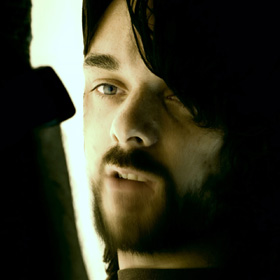
I’m guessing you’ve got a pretty sweet home recording set up.
I have:
I then use Buzz, Renoise and Cubase to create everything from there. I stay away from VSTIs (virtual studio technology) and instead draw the wave forms – which can represent percussion or synth sounds – into Renoise.
I also never got into the gear race, which makes me kinda feel like I missed out on something. But it’s been only over the last few years that I’ve played my music live, so I know my future will be more gear-centric.
I imagine that you have some mundane day-job, and that your music is your creative outlet. Am I on target? Hunz – accountant by day, musician by night?
Haha, that’s so great. No, I’m a Creative Director for a production company running the motion design team. Motion design is best generalised as “very pretty movie titles”, but like music, it has very, very deep paths that push to the other side of the spectrum.
I’ve just embarked on setting up my own motion design company called iv motion [eye-vee mo-shun]. It’s a partnership with the company where I work now. It has been a big dream of mine to see music and animation together, all made by the same creative agency, so this is a step in that direction.
In the past, I tried to do all the music and animation on my own, but I couldn’t. I need help. I need crews, and I need to pay them for their work. I am hoping this year brings about some completeness in Hunz, where people will see the two together and understand the music more. My graphics team used to be a part of a production house, but by breaking off on our own, iv motion can work with many production houses to get a broader range of work.
Okay, so I was (thankfully!) way off on my accountant-by-day assumption. Creative Director – that’s awesome. This certainly explains the kick-ass artwork and animation that accompanies your music. I friggin’ love the promo vid that you did for When Victims Fight [below].
You mentioned that you’d like to try and integrate visuals into your live show – what do you have in mind?
Thanks for the love on the promo vid! I stumbled on that idea during another job and saved off my work knowing no client would want zombie-like people walking across the screen! It often happens as you work: something will glitch out, but it looks so freek’n cool that you have to show it somehow down the line, and Hunz works out perfectly for that.
The live video aspect of Hunz will happen over a long period of time. It’s more a money/time thing, and then wanting to do it right. I have invested time into researching some fresh ideas, and with technology, the proper implementation wins over simply being the first one to use it.
I am aiming for interaction of the artist with the video to enhance the mood of the songs. The way that NIN just did their last tour was exactly along the lines of where my head space is at. I haven’t seen it, and I don’t think I am going to watch DVDs of the tour. I’ll try and remain fresh and not taint my creative ideas just yet. I heard Reznor would push on these LED displays and the video on them would move around him to make it look like he was pushing through it. Just so good to see this happening.
Your well of creativity seemingly runneth over. Music is your passion, that much is obvious. Do you have those moments where you wake up in the middle of the night and have to record something, or do you stew on ideas before working on a track?
Melodies greet me often. I’ll be walking along, looking around at life and then the shapes and colours start singing in my head. So I have a phone that records these moments as I hum in the melodies. Most of the time I sit down on the computer and start messing with sounds. Usually it starts talking to me, a flood gate opens up, and then the song is complete.
I feel like I watch the music being made for me and then I pass it on to everyone else. I had this one song that didn’t make sense to a few years back and I thought “Man, How neat is that? I can sit there and create and not know at the same time”.
The influences of artists like Boards of Canada, Radiohead and Nine Inch Nails are identifiable in your sound, but your MySpace mentions that you’re interested in “anyone who complements music with computers”. Can you elaborate on this statement, and describe how your music taste began to lean toward electronica?
That “anyone who complements music with computers” is a way to say ‘hey’ to all the demo sceners of the day, and also to give people an idea that they don’t always have to use guitars for accompaniment. It also is a subtle request for people who use computers to send me their music. I’ve come from the demo scene, and we all used computers to help bring our ideas out into the open, and this helped introduce me to electronica. I’ve always had a soft spot for hand-drawn sinewaves and sawtooths.
The lyrical content on When Victims Fight seems intensely personal; is this a trend you plan to continue?
When Victims Fight was a complex one. It was about all those arguments you have in your head as you’re thinking. I do write about myself, but very exaggerated versions of it. Enough to protect the source but to still be honest and feel it. It will continue out like this; it’s just how I work.
I have a few songs that didn’t make that album because the lyrics were so argumentative. One line is “you should do this”; the next is “well, I’m not sure if that’s where I need to go” .. and it flips around like this with no resolve.
I’m not really into much resolve either, I’m really into the reality of the journey. It’s beautiful to watch the process of people.
You currently handle most aspects of the Hunz project – production, visual, booking, promotion – yourself. Have you accepted this as par for the course due to the part-time nature of your musical career, or do you envisage enlisting external assistance?
I’m really fortunate to have a helpful band. Both guys in the band are helping me out in any way they can, but that is dependent on how much I can “let go”. Which I am learning to do. I have very high standards; some would say too high. So I’m learning that it’s okay to accept what is “second best” in my eyes, because that is still higher than what most people might expect.
I don’t know if the truth of that statement is in my heart yet, but I think it will get there.
My wife also helps out as well and has challenged me – as only someone who knows you can – to do things differently, which has been awesome.
Apart from that, I do need help. I’m creative, and although I’m learning that business is very creative too, it still isn’t my strong point. I do know what I want to achieve, and where the music is heading; I’ll just start constructing that now, and hope that I meet the right people to make it happen.
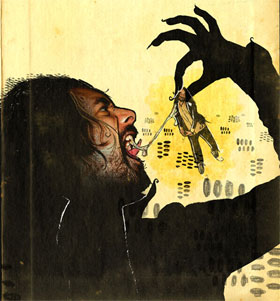 Finally – as a musician in 2009, what’s the biggest barrier to getting your music heard? How do you overcome that barrier?
Finally – as a musician in 2009, what’s the biggest barrier to getting your music heard? How do you overcome that barrier?
As I’ve developed as a musician, there are a few ways I’ve noted that you can explore as a band to get heard. I think for Hunz it’s all about people discovering the music kind of on their own. Because these themes are in the music, to do it any other way would be a lie.
I don’t want to push Hunz. I want to let it sit and take on its own life. It’s been wonderful to watch, because often when someone connects with Hunz, they become a fan and want to help me out, which just overwhelms me in the best way. Because of that approach, things take a longer amount of time, so it’s finding the balance between that and connecting with the right people who can help build a platform for you.
I will continue to perfect my art, video art and music over the years to come, and I hope you all decide to watch this process as it unfolds!
Watch the process unfold in real time by following Hunz on MySpace, Twitter and his website. You can stream his newest creation, Thoughts That Move, through the RPM Challenge site.

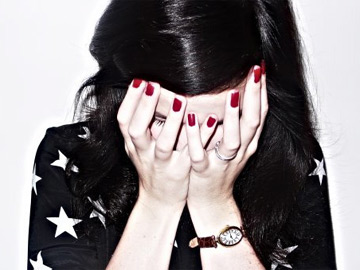 It just so happens that Jess is Digital Strategy Director at a mysterious Sydney advertising agency. She won’t say which, and she also won’t let me publish her surname. Or at leaIt’s not because she’s scared or nothin’, but on the internets, Jess is best known as the curator of a rather excellent blog called
It just so happens that Jess is Digital Strategy Director at a mysterious Sydney advertising agency. She won’t say which, and she also won’t let me publish her surname. Or at leaIt’s not because she’s scared or nothin’, but on the internets, Jess is best known as the curator of a rather excellent blog called 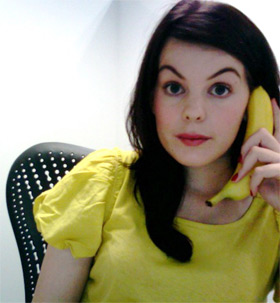
 The career path to Digital Strategy Director was not an obvious one. I was a journalist, then moved to Melbourne and could not immediately get a journalism job so I got a job doing the overseas publicity for Neighbours [pictured right *snigger*]. I only got the job because at the interview I told the producer, “You know it’s not too late to make Izzie’s baby Jack’s,” or something. Since I was spending my days trying to get freelance writing work I had had plenty of time to watch Neighbours fortunately.
The career path to Digital Strategy Director was not an obvious one. I was a journalist, then moved to Melbourne and could not immediately get a journalism job so I got a job doing the overseas publicity for Neighbours [pictured right *snigger*]. I only got the job because at the interview I told the producer, “You know it’s not too late to make Izzie’s baby Jack’s,” or something. Since I was spending my days trying to get freelance writing work I had had plenty of time to watch Neighbours fortunately.
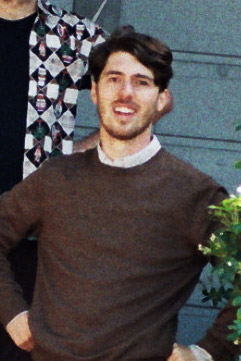 Tait Ischia
Tait Ischia
 When do you expect the RPM album to be in stores?
When do you expect the RPM album to be in stores?
 Finally – as a musician in 2009, what’s the biggest barrier to getting your music heard? How do you overcome that barrier?
Finally – as a musician in 2009, what’s the biggest barrier to getting your music heard? How do you overcome that barrier? Tim Kentley founded Melbourne’s
Tim Kentley founded Melbourne’s 